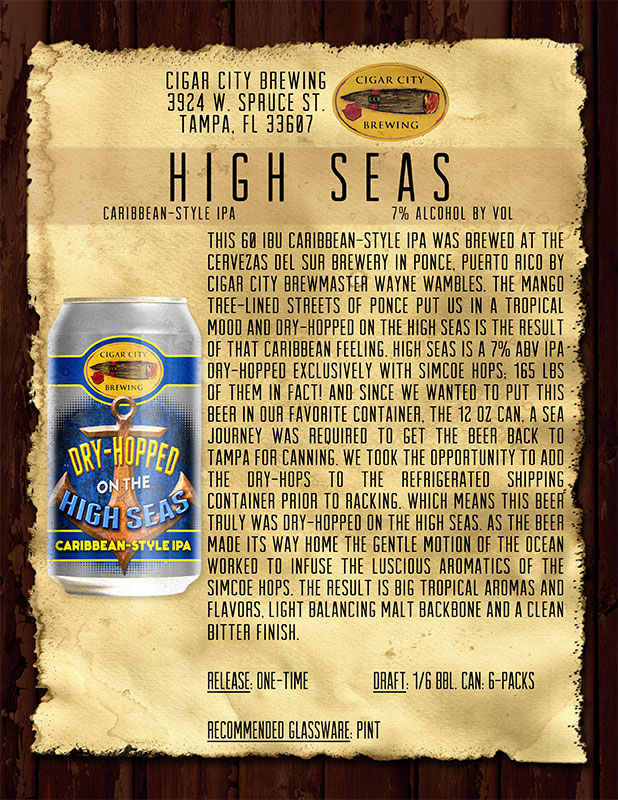
Located in Ponce, on the southern coast of the island, is the recently shuttered Cervezas del Sur brewery.
“We were interested in capacity so we went down to take a look at the system,” he said. “While down there, we got an idea to brew a beer and bring it back in pressurized, stainless steel vessels while it is dry-hopped.”
So, Dry-Hopped on the High Seas — an entirely new Cigar City brand — was born.
“We had to create an entirely new product to get to market,” he said. “It’s certainly a lot of work to do it this way but if we wanted to just brew more beer we could go contract at another location. I look at this as a side project. We like Puerto Rico as a place. It reminds me a lot of Florida and I feel comfortable there.”
Cigar City is currently brewing about 200 barrels of the beer at a time in Puerto Rico, dry-hopping the beer as it sails across the Atlantic Ocean and then packaging it in cans when it finally arrives in Tampa — a process that takes about nine days, said Redner. The company is also planning to brew multiple variations on the current, 7-percent ABV Caribbean-Style IPA. Each time, the beer will be dry-hopped with a different hop varietal and the next two releases will feature Ahtanum and Citra hops, Redner said.

“I am very comfortable with their Brewmaster, I know how they are designing their systems and it is exactly how we would do it if we were doing it from the ground-up,” he said.
Redner said he like the immediate prospect of growing via a contract partnership because there are less upfront capital costs.
“I am debt-averse, “he said. “We have tried to cash flow everything. I am very conservative and it might be to my detriment from a growth standpoint, but at the end of the day, it is my name on the documents and I have to be comfortable with whatever arrangement we are getting into. We still plan on expanding our facility; we just won’t do it as big or as fast as other breweries might.”
But slower, more managed growth for Cigar City growth doesn’t mean Redner is slowing down on launching other entrepreneurial endeavors. He and a few of his brewery employees have invested approximately $150,000 into the Cigar City Cider and Mead project which, as its name suggests, is a separate cider and mead manufacturing business.
“I like having different things going on,” he said. “If you aren’t interested in devoting the time to drink through our entire beer portfolio, we have found that some people find ciders more approachable.”
Cigar City is in the process of building out separate production space inside the brewery and awaiting approval for its license to produce cider and mead, both of which are technically classified as wine, Redner said. The company is currently producing the products at Keel and Curley Winery in nearby Plant City, Fla. and the initial consumer response has been positive.
“I think we are making about 120 barrels of draft cider per month right now,” Redner said. “That’s over 1,400 barrels annually. In our first year as a brewery we made less than 1,000 barrels.”
Redner said he’s also in the process of expanding distribution of Cigar City beer into Puerto Rico and internationally into Denmark. In 2014, the company will look at expansions into North and South Carolina, Tennessee and states along the Eastern Seaboard. Cigar City is currently only sold in Florida, Alabama, Georgia, New York City and Philadelphia.
